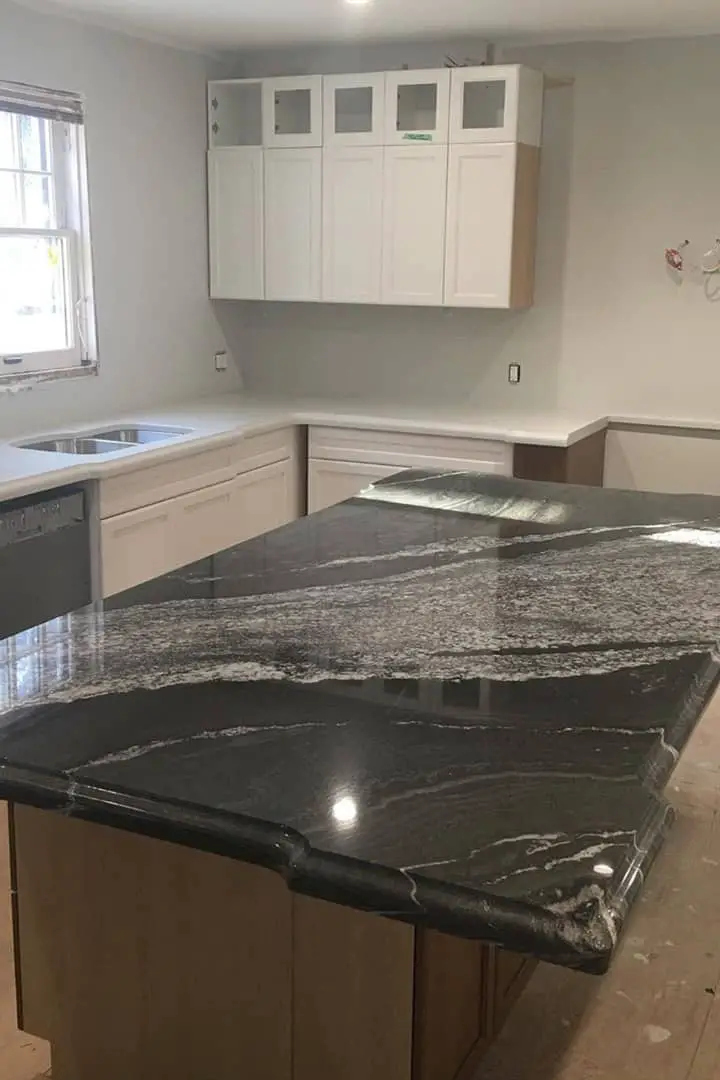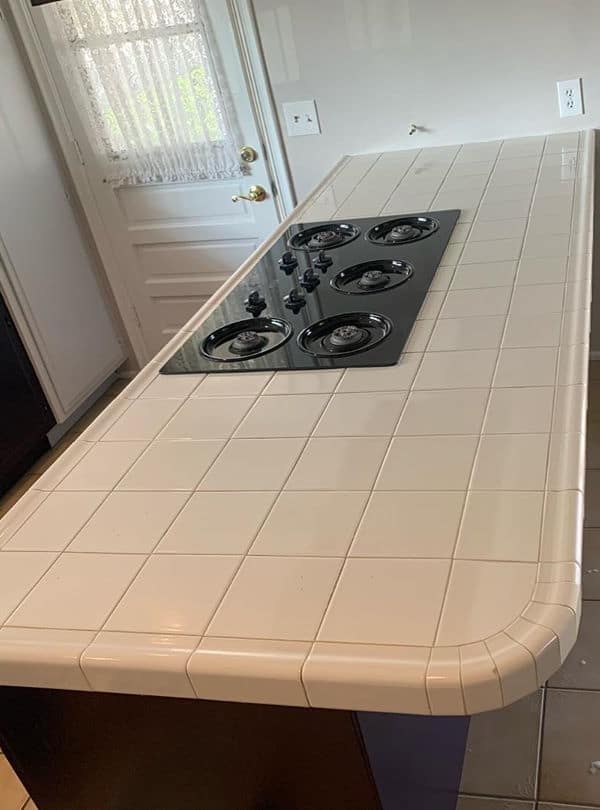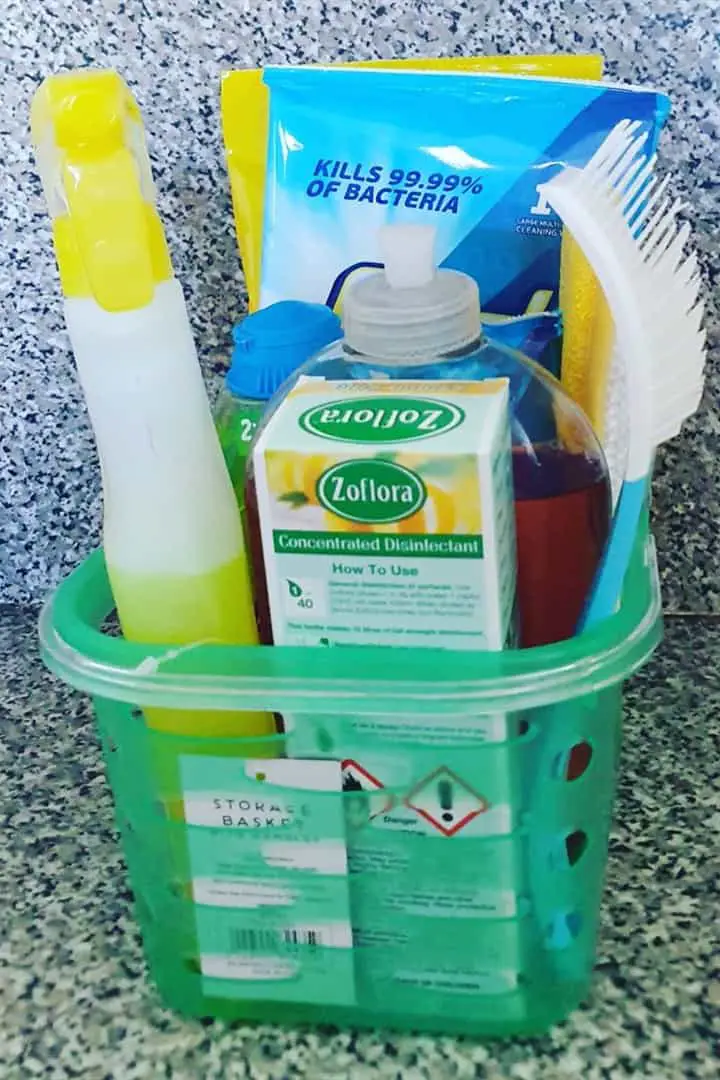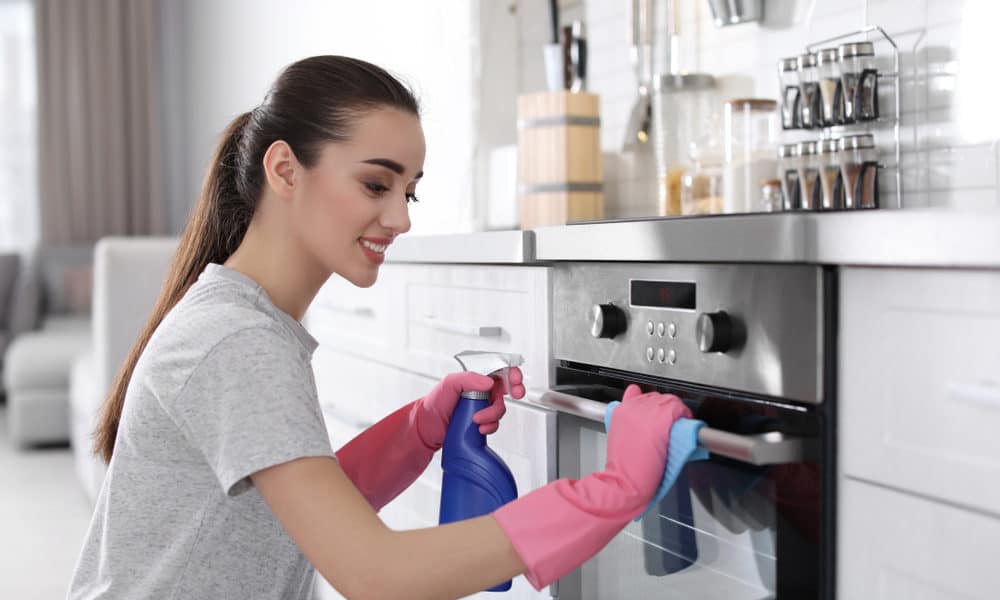Have you ever found yourself in need of something, just to look at the clock and notice that local stores are closing withing minutes? This has happened to me many times in the past.
One specific night, I needed my entire kitchen sparkling, for the next morning at 7:30 am, my in-laws were due to arrive from New Zealand.
Because I was desperate, I made a hasty choice and sadly found out what the effect of oven cleaner on kitchen countertops was.
The harsh chemicals in the oven cleaner will cause damage to all countertops. The only defining difference is the type of countertops you may have.
Let’s begin with…What is oven cleaner?
Oven cleaner, in most brands, is a mixture of propellants, cleaning agents, water, and fragrances. Some of the ingredients listed may include sodium hydroxide, sodium laureth, acrylic copolymer, dimethyl, dipropylene glycol, isobornyl acetate, isobutane, and dimethyl nonanedioate.
Some of these words are almost impossible to pronounce for the average person like me. My thoughts are, why use all of this when, probably, soap and water will get the job done.
1. If you have granite countertops

Oven cleaner will destroy the top layer of sealant and cause it to become soft, sticky, and gooey.
Sometimes, it will harden back to create a rather uneven surface, but other times, the surface will remain sticky and never solidify back to its normal state.
Having granite countertops is great if you spend a lot of time in the kitchen. It is resistant to scratches and is heat resistant also. Granite will never cause a house to look dated because it is a 100% natural material.
Each slab has a one-of-a-kind look, and it adds such character to a home. Because of its beauty and price, we definitely want to keep it looking good and in quality shape, but we must do it the correct way.
2. If you have stained or varnished wooden countertops
The toxic chemicals in the oven cleaner will treat this much like the granite countertops. They will liquify the clear sealant and create a sticky, oozy mess.
There is also the chance that the varnish will never harden again and bring back the space you once had. For cleaning, light dusting can work sometimes but, other times a cleaner is needed that will get rid of a host of spills and messes.
The best kind of cleaner for these type of cabinets is a mild soap and water. Gently use a wet rag and wash in circles until the area is clean.
3. If you have wooden countertops that have been painted:
Oven cleaner is an enemy to paint. Some people choose oven cleaner over paint thinner to help them remove paint. It strips down the sealant and removes the color within minutes.
The label on the back of a popular brand of oven cleaner, Easy Off Oven Cleaner, clearly states not to use on painted surfaces.
4. If you have laminate countertops:
This material suffers the least from the toxins in the oven cleaner, but it will cause damage to the color. There is no promise that it will cause the same discoloration all over. In turn, it could cause splotchy, color loss throughout.
Laminate is wonderful for families who are busy and have countertops that serve multiple purposes. In my home, we keep our keyrings, wallet, and coins from the day in a bowl by the sink. This can cause grime quicker than anything.
Some families may use part of their kitchen countertops for a home office, but regardless of whatever your countertops do for you during the week, keeping them clean is important. Laminate is one of the easiest surfaces to clean.
5. If you have tile countertops (glossy glazed or flat glazed)

Whether you have lovely high-gloss, glazed tile countertops or more of a matte finish, both tiles still have an outer glaze finish. Both types of finish will be removed completely due to the oven cleaner.
Then, you are left with the gritty, original feel of the tile without the smooth easy-to-work on surface.
6. If you have marble countertops
Your precious marble tops that you’ve waited on forever…don’t you dare touch with oven cleaner. They too, will lose their shine and sparkle once the polyurethane seal has been damaged.
You will be left will an uneven surface and a very expensive repair job. Experts even say to clean marble with a non-abrasive cleanser and towel. All chemicals are to be withheld, and only a mild soap can be used.
7. If you have quartz countertops
As a natural stone, quartz should be treated with the same love that those above have been given. Do not dare put that toxic cleaner on this material. It will leave you with an unfinished, unsealed surface that will cost top dollar to bring back to life.
Because quartz has a hardness of 7 on the Mohs Scale, it is very durable and is chemically unbothered by most substances. However, due to the toxicity in the oven cleaner, even quartz can’t win the fight over those chemicals.
8. If you have Corian countertops
Corian is similar to laminate. It will not acquire too much physical destruction, but it will lose color. With the many colors to choose from and its durability, Corian is a great choice to make.
Although it is used in more and more homes every year, Corian is still under-rated. It is great with large families, comes in a variety of colors, is easy to install, and has numerous other benefits including its earned, “Green Certified” label.
Some Corian collections are now made of 6% recycled materials. In July of 2017, DuPont wrote an Environmental Product Declaration stating that Corian’s uses, origins, in-use conditions, and life cycle results had been verified as “Green”.
Cleaning countertops with store-bought brands or naturally is really up to you. Some shoppers choose ready-made cleaners because they are time efficient and easy to find.
Others choose products that can be made homemade with natural ingredients. Either way, this video from Home Depot is worth watching if you would like a little extra information on keeping a spectacular kitchen.
Whatever type of countertops you may have, keep in mind the value of them. You chose them for a reason, they are there to last you a lifetime, and it is our job to keep them looking their best.
Using the appropriate cleaner will save time, money, and a variety of upsets. Countertops with sealants aren’t easy to aggravate during our daily lives, but harsh toxins that don’t belong on our beloved workspaces will cause problems any day of the week.
Use natural or store-bought cleaners meant for countertops, don’t make hasty decisions I did that one night, and keep your hands off the oven cleaner until it’s time to clean the oven.
However, if you’re restoring your father’s old writing desk, and you need to remove the original layer of varnish, then grab the oven cleaner. Go ahead, it will get the job done for you. The varnish will be stripped, and you can begin anew.
How to choose the best cleaner for your countertops

Based on what type of countertops you have, you will need to make decisions based on these recommendations:
- Decide if you wish to go with store-bought, ready-made cleaners or if you want to make homemade, natural cleaners
- Once decided, purchase or create the cleaner you desire
- Use a small bit of cleaner on the surface of your countertops to test the cleaner
- If the test area does well with the cleaner you’ve chosen, continue to clean the countertops in small circular motions until the entire surface has been completed.
Keep these reminders in place as you reach for a rag to erase the next glass of spilled juice or the sticky toddler mess that seems to appear, hourly, on its own.
The night that I had to clean for my family’s arrival, I didn’t entirely ruin my countertops. Thanks to one of those sticky toddler messes, I only sprayed oven cleaner on one section in the kitchen.
As I got the foam sprayed on the piece of countertop nearest my fridge, which is about 2 square feet in size, my little boy called for Mommy to come play dinosaurs with his playdough.
It’s so hard to say no when they’re so sweet. So, I did say yes to playing. I requested another 30 seconds to remove the foamy spray, and I grabbed my towel to wipe it away.
As I did, I could see the color fading on my beautiful green-speckled Corian. I took a deep breath, vowed not to tell my husband, and covered it with a lovely bamboo cutting board we received for our wedding years ago.
At this moment, it still sits, waiting to be discovered, yet hoping to not be found. I feel the same way about that spot of discoloration as I do about a tear in a paper or a hole in a shirt.
It bothers me, and no matter what I do to try and fix it, the obvious mess up will have to be covered with something. I guess when the bamboo cutting board wears out, I’ll have to shop for something new.
